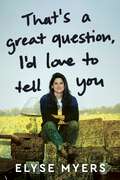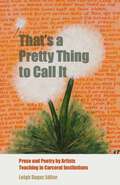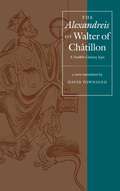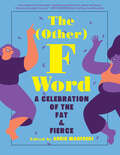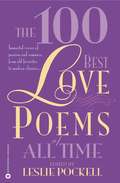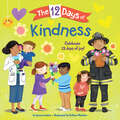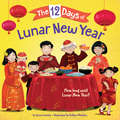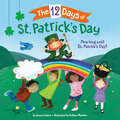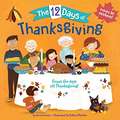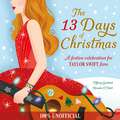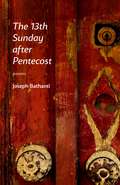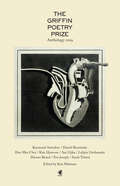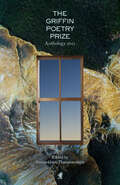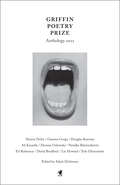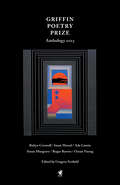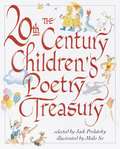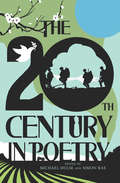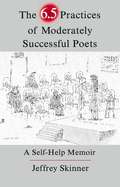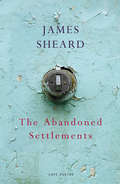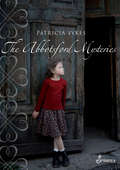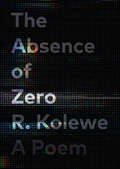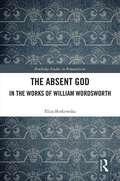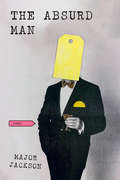- Table View
- List View
That's Me Loving You
by Amy Krouse Rosenthal Teagan WhiteFrom the author of the New York Times bestseller I Wish You More comes a book that promises continuous love and makes the perfect gift for fans of Emily Winfield Martin's The Wonderful Things You Will Be and those looking for something new to add to their shelves next to the classic The Runaway Bunny. Wherever you are, Wherever you go, Always remember And always know. . . That feeling you always have in your heart? That's me loving you. Amy Krouse Rosenthal captures parents' desire to be ever-present in this simple and touching poem offering reassurance of their love. Signs of affection can be found in the natural world around us--from a soft breeze to a shimmering star. "Combine this with a kissing hand, and children will be ready to set off on their own to explore the world, safe in the knowledge that they are loved. " --Kirkus Reviews
That's a Great Question, I'd Love to Tell You
by Elyse MyersWriter, comedian, and content creator Elyse Myers gets real about life’s awkward moments in her bold, funny, and unfiltered debut bookElyse Myers is known to her twelve million followers as “The Internet’s Best Friend,” sharing her relatable stories and comedic sketches and serving as an advocate for topics such as neurodivergence, impostor syndrome, body image, and more. Whether she’s making people laugh with tales of disastrous dates or giving a voice to that awkward internal monologue many of us have, she has three simple goals behind everything she makes: To make people feel known, loved, and like they belong.In That's a Great Question, I'd Love to Tell You, Elyse delivers a debut collection of deeply personal stories and hand-drawn illustrations, offering even more intimate reflections beyond what fans have seen on her social media, including:Spending 7 Minutes in Heaven accidentally friend-zoning her crushHow Lucy, the Magic 8 Ball keychain, changed her life by accidentMoving from California to Australia to Texas to Nebraska to like (maybe even love!) herselfHow to Fold Hospital Corners in 10 EASY STEPS!—a practical guide and a rumination about…everythingThe “meat cute” when she met her smoke show of a husband at a butcher’s counter in Australia—and how she revealed herself to be an emotional runnerPlus, tales involving bad dates and is-this-a-dates; the tempting yet futile urge to reinvent yourself, panic attacks and escape hatches, and favorite pens and systems to use them, all while loving and letting yourself be loved, preferably at the same time.
That's a Pretty Thing to Call It: Prose and Poetry by Artists Teaching in Carceral Institutions
by Leigh SugarFrank, eye-opening writing by "arts in corrections" educatorsPoetry and prose by artists, writers, and activists who’ve taught workshops in U.S. criminal legal institutions, including acclaimed writers Ellen Bass, Joshua Bennett, Jill McDounough, E. Ethelbert Miller, Idra Novey, Joy Priest, Paisley Rekdal, Christopher Soto, and Michael Torres; the late arts in corrections pioneers Buzz Alexander and Judith Tannenbaum; and Guggenheim Award-winning choreographer Pat Graney. These educators demonstrate a diverse range of experiences. Among the questions they ask: Does our work support the continuation or deconstruction of a mass incarcerating society? What led me to teach in prison? How do I resist the “savior” or “helper” narrative? A book for anyone seeking to understand the prison industrial complex from a human perspective. All author royalties from this book will be donated to Dances for Solidarity, a project that brings arts opportunities to people incarcerated in solitary confinement.
The "Alexandreis" of Walter of Chatilon
by David TownsendWritten sometime in the 1170s, Walter of Chatillon's Latin epic on the life of Alexander the Great loomed as large on literary horizons as the works on Jean de Meun, Dante, or Boccaccio. Within a few decades of its composition, the poem had become a standard text of the literary curriculum. Virtually all authors of the thirteenth through fifteenth centuries knew the poem. And an extraordinary two hundred surviving manuscripts, elaborately annotated, attest both to the popularity of the Alexandreis and to the care with which it was read by its medieval audience.
The (Other) F Word: A Celebration of the Fat & Fierce
by Angie Manfredi“This outstanding anthology of essays, illustrations, poems, and letters . . . is a celebration of every body and presents a revolutionary message” (Publishers Weekly, starred review). The time has come for fat people to tell their own stories. The (Other) F Word combines the voices of Renée Watson, Julie Murphy, Jes Baker, Samantha Irby, Bruce Sturgell, and many others in a relatable, revelatory and inspiring exploration of body image and fat acceptance. This dazzling collection of art, poetry, essays, and fashion tips is meant for people of all sizes who desire to be seen and heard in a culture consumed by a narrow definition of beauty. By combining the talents of renowned fat YA and middle-grade authors, as well as fat influencers and creators, The (Other) F Word offers teen readers and activists of all ages a tool for navigating our world with confidence and courage.
The 100 Best Love Poems of All Time
by Leslie PockellHere, in one compact volume, is a greatest hits collection of the 100 bets love poems ever written by 100 of the world's greatest poets. This essential anthology is ideal for the romantic-and will inspire any cynic. The poets included range throughout the history of world literature: from the Classics (Sappho, Catullus) and Renaissance (Shakespeare, Donne, Dante) to the Romantics (Shelly, Keats, Wordsworth) and 20th century giants (Frost, Lorca, Graves), right down to the present day (Viorst, Patchen, Neruda). Each poem features a brief introduction, which details the poet's life history as well as the poem's significance
The 12 Days of Kindness (The 12 Days of)
by Jenna LetticeCount out twelve ways to celebrate and honor our friends, family, neighbors, and first responders with small acts of kindness! This fun-filled picture book inspired by "The 12 Days of Christmas" is perfect for fans of Natasha Wing's The Night Before series. Includes stickers!This festive edition to the 12 Days series features sweet, easily achievable acts of empathy like picking flowers for neighbors, writing thank you notes to first responders, and delivering baked goods to loved ones. Young readers and their caregivers will enjoy counting all the different ways they can engage with their communities. This simple rhyming story is paired with cheery illustrations and a full page of stickers, making these books the perfect summertime gift for kids.
The 12 Days of Lunar New Year (The 12 Days of)
by Jenna LetticeCount out twelve ways to celebrate Lunar New Year! This fun-filled picture book inspired by "The 12 Days of Christmas" is perfect for fans of Natasha Wing's The Night Before series. Includes stickers!This cheery addition to the 12 Days series celebrates tradition, culture, and family in the lead-up to Lunar New Year! Young readers and their caregivers will enjoy counting all the different ways they can engage with their communities and honor their ancestors. This simple rhyming story is paired with warm illustrations and a full page of stickers, making these books the perfect gift for kids.
The 12 Days of St. Patrick's Day (The 12 Days of)
by Jenna LetticeCount the 12 days of St. Patrick's Day with this fun-filled picture book inspired by "The 12 Days of Christmas"--perfect for fans of Natasha Wing's The Night Before series. Includes stickers for a fantastic schooltime reward!Count the 12 days of St. Patrick's Day! On the first day of St. Patrick's, I was lucky to find... This festive story starts with a shamrock in a field of green, then adds TWO pots of gold, THREE top hats, and so on through twelve busy days leading up to St. Patrick's Day. Young readers and their caregivers will enjoy counting all the details of the fun preparation for the big day. This simple rhyming story is paired with cheery illustrations and a full page of stickers, making it the perfect springtime gift for kids.
The 12 Days of Thanksgiving (The 12 Days of Series)
by Jenna Lettice"On the first day of Thanksiving, I was thankful for..." This festive story starts with ONE cozy evening at home with family, then adds TWO sacks of apples, and THREE fall squash, counting up through the twelve days leading to Thanksgiving. Kids will love spotting all the fun ways a family gets ready for Thanksgiving. And the book includes stickers—perfect treats for each of the 12 days.
The 13 Days of Christmas: A festive celebration for Taylor Swift fans
by Tiffany GarlandCount down and sing along to Christmas in this Taylor-twist on the classic festive song!An irresistible ode to Taylor Swift and her loyal, dedicated fans. Like the perfect stocking, The 13 Days of Christmas is filled to the brim with goodies to find - from friendship bracelets to delicious chai sugar cookies to chunky cardigans and lots more.Cozy up with a cup of hot chocolate as you pore over the pages of this festive book and count down from thirteen selfies to one very special star atop the tree . . .The perfect stocking-filler for all Swifties!This book has not been authorised, licensed or endorsed by Taylor Swift, TAS Rights Management, LLC, Taylor Nation, LLC, Taylor Swift Productions, Inc. or UMG Commercial Services, Inc.
The 13th Sunday after Pentecost: Poems (Voices of the South)
by Joseph BathantiIn The 13th Sunday after Pentecost, Joseph Bathanti offers poems that delve deep into a life reimagined through a mythologized past. Moving from his childhood to the present, weaving through the Italian immigrant streets of Pittsburgh, Pennsylvania, to his parochial school, from the ballpark to church and home again, these contemplative poems present a situation unique to the poet but familiar to us all. As Bathanti recalls the joys, struggles, and confusion of his formative years in the late fifties and into the sixties, he gains a deeper understanding of the often surreal, always paradoxical world around him. He explores the perceived injustices of childhood, observes the mysteries of religious rituals, and examines the complex emotions families experience as children grow up and parents grow old. These poems divulge an eventful life, compelling us to reflect on our own as we confront a world of wonder and uncertainty. Across the strike zone swoops a dove, maybe an angel. You’re in Pittsburgh, March; it’s snowing. All week you’ve seen angels; everyone’s tired, proclaiming even horrid things angels, intimating miracles. Johnson’s pitch obliterates the bird— a hail of feathers and dander, as if inside a tiny bomb detonated. Like a cartoon. Thoroughly unbelievable. Around you, people are dying. But you ignore it. You laugh at the massacred dove. It’s not funny, but you laugh. You could cry, rip your hair out, your clothes off, crash through the seventhfloor window into the slushy black streets of the city. It’s funny because it’s not. —from “Angels”
The 2019 Griffin Poetry Prize Anthology: A Selection of the Shortlist (The Griffin Poetry Prize Anthology #2019)
by Edited by Kim MaltmanThe prestigious and highly anticipated annual anthology of the best Canadian and international poetry from the shortlist of the 2019 Griffin Poetry Prize. Each year, the best books of poetry published in English internationally and in Canada are honoured with the Griffin Poetry Prize, one of the world’s most prestigious and richest literary awards. Since 2001 this annual prize has spurred interest in and recognition of poetry, focusing worldwide attention on the formidable talent of poets writing in English and works in translation.
The 2021 Griffin Poetry Prize Anthology: A Selection of the Shortlist (The Griffin Poetry Prize Anthology #2021)
by Edited by Souvankham ThammavongsaThe prestigious and highly anticipated annual anthology of the best Canadian and international poetry from the shortlist of the 2021 Griffin Poetry Prize.Each year, the best books of poetry published in English internationally and in Canada are honoured with the Griffin Poetry Prize, one of the world’s most prestigious and richest literary awards. Since 2001, this annual prize has tremendously spurred interest in and recognition of poetry, focusing worldwide attention on the formidable talent of poets writing in English and works in translation. Annually, The Griffin Poetry Prize Anthology features the work of the extraordinary poets shortlisted for the awards and introduces us to some of the finest poems in their collections.
The 2022 Griffin Poetry Prize Anthology: A Selection of the Shortlist (The Griffin Poetry Prize Anthology)
by Edited by Adam DickinsonThe prestigious and highly anticipated annual anthology of the best Canadian and international poetry from the 2022 Griffin Poetry Prize shortlist. Each year, the best books of poetry published in Canada and internationally in English are honoured with the Griffin Poetry Prize, one of the world’s richest literary awards. Since 2001, this annual prize has spurred interest in and recognition of poetry, focusing worldwide attention on the formidable talent of poets.The Griffin Poetry Prize Anthology features the work of extraordinary poets shortlisted for the awards and introduces us to some of the finest poems from their collections. Featuring works from shortlisted poets Sharon Dolin, Gemma Gorga, Douglas Kearney, Ali Kinsella, Dzvinia Orlowsky, Natalka Bilotserkivets, Ed Roberson, David Bradford, Liz Howard, and Tolu Oloruntoba.
The 2023 Griffin Poetry Prize Anthology: A Selection of the Shortlist (The Griffin Poetry Prize Anthology)
by Robyn Creswell; Ada Limon; Susan Musgrave; Roger Reeves; Ocean Vuong; Gregory Scofield Nicole LambeThe prestigious and highly anticipated annual anthology of the best poetry from the shortlist of the 2023 Griffin Poetry Prize. Each year, the best books of poetry published in English are honoured with the Griffin Poetry Prize, one of the world’s most prestigious and richest literary awards. Since 2001, this annual prize has tremendously spurred interest in and recognition of poetry, focusing worldwide attention on the formidable talent of poets writing in English and works in translation. Annually, The Griffin Poetry Prize Anthology features the work of the extraordinary poets shortlisted for the awards and introduces us to some of the finest poems in their collections. Featuring works from shortlisted poets Robyn Creswell, Iman Mersal, Ada Limón, Susan Musgrave, Roger Reeves, and Ocean Vuong.
The 20th Century Children’s Poetry Treasury
by Jack PrelutskyA collection of more than 200 poems by such modern poets as Nikki Grimes, John Ciardi, Karla Kuskin, Ted Hughes, e. e. cummings, Eve Merriam, Deborah Chandra, Arnold Adoff, and more than 100 others.
The 20th Century in Poetry
by Michael Hulse Simon RaeThe history of the twentieth century as seen through the eyes of the greatest poets of our time This groundbreaking anthology presents in chronological order over four hundred poems written during the twentieth century. The authors, both published poets themselves, give an overview of each period of history, while notes to the poems place each one in its historical context and trace the century's poetic development. Concise biographies for each poet complete the anthology. By organizing the poems in chronological order, readers will see poets in a new light. Here A. E. Houseman, for example, rubs shoulders with T. S. Eliot, showing that traditional forms can hold their own against the modernist orthodoxy. All the major events of the twentieth century are reflected in the choice of poems within these pages. Including poems by Noël Coward, Rudyard Kipling, James Joyce, D. H. Lawrence, Robert Frost, G. K. Chesterton, Ezra Pound, Philip Larkin, T. S. Eliot, Wallace Stevens, Langston Hughes, William Carlos Williams, W. H. Auden, e. e. cummings, Dylan Thomas, Kingsley Amis, Allen Ginsberg, Lawrence Ferlinghetti, Frank O'Hara, Ted Hughes, Sylvia Plath, John Updike, Robert Penn Warren, among a host of others, this richly rewarding collection captures the history of the twentieth century within one monumental volume.
The 6.5 Practices of Moderately Successful Poets
by Jeffrey SkinnerA private eye turned moderately successful poet leads readers on a satiric, hopeful tour of how to make a life in the arts, while still having a life. Revealing, hilarious, and peppered with sly takes on the ins and outs of contemporary American poetry (chapters include "The Silence of the Iambs," "The Revisionarium, Ask Dr. Frankenpoem," and "The Periodic Table of Poetic Elements"), Jeffrey Skinner offers advice, candor, and wit.Revision is the process a poem endures to become its best self.Or, if you are the poet, you are the process a poem endures to become its best self.Endures because a first draft, like all other objects in the universe, has inertia and would prefer to stay where it is. The poet must not collaborate.Best self because the poem is more like a person than a thing, and does not strenuously object to personification.Yo, poem.But let's not get carried away. It's your poem and you can treat it as you wish; sweet talk it; push it around if that's what it takes. Alfred Hitchcock notoriously said of the actors in his movies, "They are cattle."Jeffrey Skinner is the author of five books of poetry, most recently Salt Water Amnesia (Ausable Press, 2005). His poems have appeared in The New Yorker, The Atlantic, The Nation, The American Poetry Review, Poetry, BOMB, and The Paris Review, and his work has earned awards from the National Endowment for the Arts, The Ingram Merrill Foundation, and the Howard Foundation.
The Abandoned Settlements
by James SheardShortlisted for the 2017 T. S. Eliot PrizePBS Autumn RecommendationThe poems in James Sheard’s remarkable third book are about love and leaving, of how the rift of departure brings on a kind of haunting – of the people involved and the places where they lived – an emotional trace of departed lives and loves. This is what these poems are: the scars of separation, the spoors of desire. Sheard writes powerfully about loss, about how the vestiges of significance, of sensual heat, are retained by structures – in ghost towns, war-zones, deserted villages or resorts – but also by the human body and memory: ‘for love exists, and then is ruined, and then persists.’These are poems about permanence and fragility, of being uncertain whether the house you live in is a shell, or if you have become a shell by living there – whether emptiness means loss and abandonment or a clean start and a new beginning. But these are also poems full of the ache of desire, the tart, lingering smell of sex: poems shaped by longing.James Sheard is one of Britain’s most assured and precise lyric poets, and his third collection brings all his considerable strengths to poems as accurate and strange as thermal images.
The Abbotsford Mysteries
by Patricia SykesThe Abbotsford Convent becomes more than the setting of this poetry collection; it emerges as presence, intimate and familiar as well as constraining and forbidding. But, it is childhood itself that becomes the subterranean geography and pulse of this compilation as the poems explore what it means to grow up in an orphanage. Subject to the rules of lay and religious adults, the voices herein create multiple pathways through memory and time as they map and navigate the many-stranded mysteries of their institutionalized lives.
The Absence of Zero
by R. KoleweThe Absence of Zero is a triumphantly-executed celebration of the long poem tradition. Consisting of 256 16-line quartets, and 34 free-form interruptions, this slow-moving haunting work is a beautiful example of thinking in language, a meditation that explores time and memory in both content and form. The 20th century is already more than 20 years past: The Absence of Zero is Kolewe's elegy to that era, and the disparate fragments of its ideas that continue to affect and disrupt our present.Praise for The Absence of Zero:"The interiors of R. Kolewe's epic poem The Absence of Zero, are anything but ... observance upon observance then another, continuous action … past and continuing, teeter, falter, tick by, lob between thoughts, threads, memories, what is, what was, what might befall, or. "Read again. Nothing beautiful." and absolutely absorbing, returning again and again to this place, this street, this window, this room. Know that once you enter, there is no going back. The presence of absence, all too familiar, begins to read, occupy you. It's a glorious achievement. Prepare to be mesmerized." —KIRBY, author of Poetry is Queer"Ralph Kolewe's The Absence of Zero is a daring, daily progression that depends upon return as palimpsest. Call it what it is. Gorgeous. Steadfastly urgent. Patient as dawn." —Margaret Christakos, author of charger and Dear Birch
The Absent God in the Works of William Wordsworth (Routledge Studies in Romanticism)
by Eliza BorkowskaCalled by one of its reviewers "Wordsworth’s biographia literaria," this book takes its reader on a fascinating journey into the mind of the poet whose attitude to God and religion points to a major shift in Western culture. The monograph probes the philosophical foundations of Wordsworth’s religious outlook, drawing attention to this First Generation Romantic poet as the author who happened to record in his verse the rise to prominence of some of the intellectual and spiritual challenges and the most troublesome uncertainties that have defined Western man ever since. The book constitutes a self-contained whole and can be read independently. Simultaneously, it creates an unusual duet with the companion volume, The Presence of God in the Works of William Wordsworth. These two works can be regarded as contraries—or negatives: one offering an ironically positive reading of Wordsworth’s religious discourse, the other offering a reading which is positively negative.
The Absurd Man: Poems
by Major JacksonIn this knock-out collection, Major Jackson savors the complexity between perception and reality, the body and desire, accountability and judgment. Inspired by Albert Camus’s seminal Myth of Sisyphus, Major Jackson’s fifth volume subtly configures the poet as “absurd hero” and plunges headfirst into a search for stable ground in an unstable world. We follow Jackson’s restless, vulnerable speaker as he ponders creation in the face of meaninglessness, chronicles an increasingly technological world and the difficulty of social and political unity, probes a failed marriage, and grieves his lost mother with a stunning, lucid lyricism. The arc of a man emerges; he bravely confronts his past, including his betrayals and his mistakes, and questions who he is as a father, as a husband, as a son, and as a poet. With intense musicality and verve, The Absurd Man also faces outward, finding refuge in intellectual and sensuous passions. At once melancholic and jubilant, Jackson considers the journey of humanity, with all its foibles, as a sacred pattern of discovery reconciled by art and the imagination.

